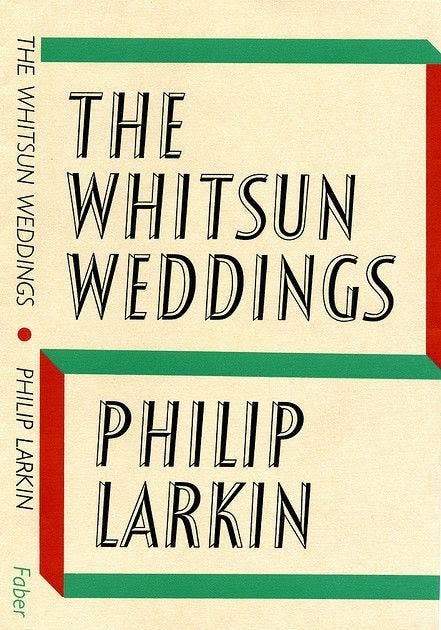Netflix’s recent adaption of David Nicholls’s One Day opens with a poem, read as the camera pans across rooftops. Well, half a poem:
What are days for? Days are where we live. They come, they wake us time and time over. They are to be happy in: Where can we live but days?
When I was first reading Larkin, ‘Days’ was one of the poems I kept coming back to. I don’t think it’s particularly typical, although it’s surprising how many Larkin poems you can say that about. There’s a curious (but also typical) combination of chattiness and an almost European existential doubt in those short, aphoristic lines. Days are where we live, but also a kind of object. It’s as if the speaker is alone in a bare, sunlit room with one of them, turning it over with a pencil.
There’s something a bit instapoet to all this. Is it profound, or are the lines just short? It’s almost (almost) the kind of thing a moody teenager might stick on their wall. You only ask what days are for if you have a lot of time to kill. But then, I think it helps to understand and appreciate Larkin if we recognise that many of his best poems are just that: young person’s poems. It is no slight on them although, again, it doesn’t fit the familiar image. Much of Larkin’s poetry imagines an argument between freedom (for Larkin, often the same thing as selfishness) and something which we may as well call responsibility, or commitment, or simply other people. The other people rarely win out.1
I love ‘Days’. That first stanza has such charisma. ‘They come, they wake us / time and time over’ is beautiful, the second line echoing without repeating the rhythm of the first. But it’s the second stanza which always stuck with me.
Ah, solving that question brings the doctor and priest in their long coats running over the fields.
It is a wonderfully creepy image, exact and strange. I see the doctor and the priest racing like dads at a school sports day, though they might equally be running over different fields towards the same location.
What are days for? Well, this is Philip Larkin: days are for dying. Hence doctors, hence priests. Strangely, almost unbelievably, I didn’t see death in the poem until a few weeks ago. When I first read it, as a moody teenager, I thought ‘Days’ was about freedom. The first stanza, as I read it, was a lesson about living in the moment, like an artist or a poet (or, in retrospect, a child). The doctors and priests were authority figures, determined to answer questions that shouldn’t or couldn’t be answered, to worry us into living somewhere other than days. It was the artist (i.e. the teenager) against society. Death might have been in the background, but he wasn’t the heart of the poem. I was focused on the runners (the interfering adults) not what they were running towards.
Of course, both readings can be true. And there is, of course, another event which brings in the doctor and the priest and which solves the question of what to do with days, which might have been at the back of Larkin’s mind, or else is conspicious by its absence in the poem’s world. Larkin never had children. Some of his most well-known poems are about not wanting to, though behind the bluff there is also injury and self-doubt (‘where do these innate assumptions come from? Not from what / We think truest, or want most to do’). It’s curious how many critics have taken the bluff at face value. But that’s a different story.2
When I see self-consciously “Trad” accounts on X/Twitter sharing Larkin quotes I wonder if they’ve really read him, or just liked the sound of his more racist letters.
For a while now I’ve been running away from writing a book about Philip Larkin. It is quite possibly a very silly idea, not least because I have a few more important things on at the moment. But I can’t get the idea out of my head. Now I wonder if I shouldn’t be running towards it, first by telling more people (hello) and then by making a start here. I’m not yet sure what that actually means in practice and I will keep writing about other things too. If you keep reading, I’ll assume you’re prepared to see where it goes.



Do it! Your insight that many Larkin poems are *untypical* would be a great one to develop into a book. Too much Larkin criticism — like much Eliot criticism — has been concerned with making a small body of high quality poems cohere. But Larkin’s inability to repeat himself easily is one of the things that distinguishes him.
Well, hello! I loved the thought of days as object and the image of Larkin "...alone in a bare, sunlit room with one of them, turning it over with a pencil." And I would like to see where all this will lead you.
I haven't read many of his poems, but "Days" is a favourite one and also "Dublinesque".